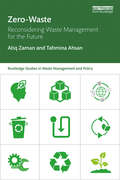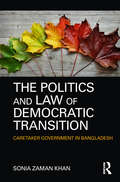- Table View
- List View
Antiracism: An Introduction
by Alex ZamalinAn introduction to antiracism, a powerful tradition crucial for energizing American democracyOn August 12, 2017, in Charlottesville, Virginia, a rally of white nationalists and white supremacists culminated in the death of a woman murdered in the street. Those events made clear that racism is alive and well in the United States of America. However, they also brought into sharp relief another American tradition: antiracism. While racists marched and chanted in the streets, they were met and matched by even larger numbers of protesters calling for racism’s end. Racism is America’s original and most enduring sin, with well-known historic and contemporary markers: slavery, lynching, Jim Crow, redlining, mass incarceration, police brutality. But racism has always been challenged by an opposing political theory and practice. Alex Zamalin’s Antiracism tells the story of that opposition.The most theoretically generative and politically valuable source of antiracist thought has been the black American intellectual tradition. While other forms of racial oppression—for example, anti-Semitism, Islamophobia, and anti-Latino racism—have been and continue to be present in American life, antiblack racism has always been the primary focus of American antiracist movements. From antislavery abolition to the antilynching movement, black socialism to feminism, the long Civil Rights movement to the contemporary Movement for Black Lives, Antiracism examines the way the black antiracist tradition has thought about domination, exclusion, and power, as well as freedom, equality, justice, struggle, and political hope in dark times.Antiracism is an accessible introduction to the political theory of black American antiracism, through a study of the major figures, texts, and political movements across US history. Zamalin argues that antiracism is a powerful tradition that is crucial for energizing American democracy.
Black Utopia: The History of an Idea from Black Nationalism to Afrofuturism
by Alex ZamalinWithin the history of African American struggle against racist oppression that often verges on dystopia, a hidden tradition has depicted a transfigured world. Daring to speculate on a future beyond white supremacy, black utopian artists and thinkers offer powerful visions of ways of being that are built on radical concepts of justice and freedom. They imagine a new black citizen who would inhabit a world that soars above all existing notions of the possible.In Black Utopia, Alex Zamalin offers a groundbreaking examination of African American visions of social transformation and their counterutopian counterparts. Considering figures associated with racial separatism, postracialism, anticolonialism, Pan-Africanism, and Afrofuturism, he argues that the black utopian tradition continues to challenge American political thought and culture. Black Utopia spans black nationalist visions of an ideal Africa, the fiction of W. E. B. Du Bois, and Sun Ra’s cosmic mythology of alien abduction. Zamalin casts Samuel R. Delany and Octavia E. Butler as political theorists and reflects on the antiutopian challenges of George S. Schuyler and Richard Wright. Their thought proves that utopianism, rather than being politically immature or dangerous, can invigorate political imagination. Both an inspiring intellectual history and a critique of present power relations, this book suggests that, with democracy under siege across the globe, the black utopian tradition may be our best hope for combating injustice.
Struggle on Their Minds: The Political Thought of African American Resistance
by Alex ZamalinAmerican political thought has been shaped by those who fought back against social inequality, economic exclusion, the denial of political representation, and slavery, the country's original sin. Yet too often the voices of African American resistance have been neglected, silenced, or forgotten. In this timely book, Alex Zamalin considers key moments of resistance to demonstrate its current and future necessity, focusing on five activists across two centuries who fought to foreground slavery and racial injustice in American political discourse. Struggle on Their Minds shows how the core values of the American political tradition have been continually challenged—and strengthened—by antiracist resistance, creating a rich legacy of African American political thought that is an invaluable component of contemporary struggles for racial justice.Zamalin looks at the language and concepts put forward by the abolitionists David Walker and Frederick Douglass, the antilynching activist Ida B. Wells, the Black Panther Party organizer Huey Newton, and the prison abolitionist Angela Davis. Each helped revise and transform ideas about power, justice, community, action, and the role of emotion in political action. Their thought encouraged abolitionists to call for the eradication of slavery, black journalists to chastise American institutions for their indifference to lynching, and black radicals to police the police and to condemn racial injustice in the American prison system. Taken together, these movements pushed political theory forward, offering new language and concepts to sustain democracy in tense times. Struggle on Their Minds is a critical text for our contemporary moment, showing how the political thought that comes out of resistance can energize the practice of democratic citizenship and ultimately help address the prevailing problem of racial injustice.
American Political Thought: An Alternative View
by Alex Zamalin Jonathan KellerThe twenty-first century presents unique political challenges, like increasing concern over racially based police brutality and mass incarceration, continuing economic and gender inequality, the rise of conservative and libertarian politics, and the appropriate role of religion in American politics. Current scholarship in American political thought research neither adequately responds to the contemporary moment in American politics nor fully captures the depth and scope of this rich tradition. This collection of essays offers an innovative expansion of the American political tradition. By exposing the major ideas and thinkers of the four major yet still underappreciated alternative traditions of American political thought—African American, feminist, radical and conservative—this book challenges the boundaries of American political thinking about such values like freedom, justice, equality, democracy, economy, rights, identity, and the role of the state in American life. These traditions, the various authors show in different ways, not only present a much fuller and more accurate characterization of what counts as American political thought. They are also especially unique for the conceptual resources they provide for addressing contemporary developments in American politics. Offering an original and substantive interpretation of thinkers and movements, American Political Thought will help students understand how to put American political thought into conversation with contemporary debates in political theory.
Zero-Waste: Reconsidering Waste Management for the Future (Routledge Studies in Waste Management and Policy)
by Atiq Zaman Tahmina AhsanThis book analyses ‘zero-waste’ (ZW) as an emerging waste management strategy for the future, which considers waste prevention through innovative design and sustainable consumption practices. Drawing on a diverse range of case studies from Australia, Bangladesh, Japan, New Zealand, Sweden, and the USA, this book explores why urban waste management systems still remain a major challenge for almost all cities around the world. Rejecting waste as an ‘end-of-life’ problem, Atiq Zaman and Tahmina Ahsan instead consider waste prevention through the ZW model, in which resources are utilized and consumed with minimum environmental degradation. In addition, the authors give extended discussion on why embracing the ZW concept will be beneficial for the circular economy (CE). Providing a strategic zero-waste framework and an evaluation tool to measure waste management performance aimed towards ZW goals, this book will be of great relevance to students, scholars, and policymakers with an interest in waste management, sustainable consumption, urban planning, and sustainable development.
Challenging Colonial Administrative Behavior in Bangladesh
by Hasanuzzaman ZamanThis book studies public policy and administration in Bangladesh. It studies how, despite recording high-levels of corruption persistently, some governments in least developed countries (LDCs) like Bangladesh have achieved impressive online transformation level, through digital, electronic or e-Government implementation. The book investigates the historical and political context, and examines the different policies and strategies adopted by successive governments of Bangladesh for facilitating digital service delivery transformation of traditional, paper-based, circuitous public service delivery processes. It reviews public administration reforms introduced over several decades, and other initiatives launched with the specific objective of improving service delivery management. The volume also contextualizes the new e-Government development initiatives in light of the various approaches such as traditional public administration, new public management, digital era governance, new public governance, and design thinking. Drawing on a host of published and unpublished materials, interviews with senior public officials, academics, representatives of international donor agencies, think tanks and non-governmental organizations, and a survey of more than 400 plus bureaucrats, the book analyzes the progress of digital government in Bangladesh from a soft, behavioral perspective. It will be of great interest to scholars and researchers of public policy and public administration, politics, innovation, and South Asian studies. It will be an essential reading for bureaucrats and government officials, as well as think tanks and NGOs.
The Politics and Law of Democratic Transition: Caretaker Government in Bangladesh
by Sonia Zaman KhanPeaceful legal and political ‘changing of the guards’ is taken for granted in developed democracies, but is not evident everywhere. As a relatively new democracy, marred by long periods of military rule, Bangladesh has been encountering serious problems because of a prevailing culture of mistrust, weak governance institutions, constant election manipulation and a peculiar socio-political history, which between 1990 and 2011 led to a unique form of transitional remedy in the form of an unelected neutral ‘caretaker covernment’ (CTG) during electoral transitions. This book provides a contextual analysis of the CTG mechanism including its inception, operation, manipulation by the government of the day and abrupt demise. It queries whether this constitutional provision, even if presently abolished after overseeing four acceptable general elections, actually remains a crucial tool to safeguard free and fair elections in Bangladesh. Given the backdrop of the culture of mistrust, the author examines whether holding national elections without a CTG, or an umpire of some kind, can settle the issue of credibility of a given government. The book portrays that even the management of elections is a matter of applying pluralist approaches. Considering the historical legacy and contemporary political trajectory of Bangladesh, the cause of deep-rooted mistrust is examined to better understand the rationale for the requirement, emergence and workings of the CTG structure. The book unveils that it is not only the lack of nation-building measures and governments’ wish to remain in power at any cost which lay behind the problems that Bangladesh faces today. Part of the problem is also the flawed logic of nation-building on the foundation of Western democratic norms which may be unsuitable in a South Asian cultural environment. Although democratic transitions, on the crutch of the CTG, have been useful in moments of crisis, its abolition creates the need for a new or revised transitional modality – perhaps akin to the CTG ethos – to oversee electoral governance, which will have to be renegotiated by the polity based on the people’s will. The book provides a valuable resource for researchers and academics working in the area of constitutional law, democratic transition, legal pluralism and election law.
Islam in Pakistan: A History (Princeton Studies in Muslim Politics #68)
by Muhammad ZamanThe first book to explore the modern history of Islam in South AsiaThe first modern state to be founded in the name of Islam, Pakistan was the largest Muslim country in the world at the time of its establishment in 1947. Today it is the second-most populous, after Indonesia. Islam in Pakistan is the first comprehensive book to explore Islam's evolution in this region over the past century and a half, from the British colonial era to the present day. Muhammad Qasim Zaman presents a rich historical account of this major Muslim nation, insights into the rise and gradual decline of Islamic modernist thought in the South Asian region, and an understanding of how Islam has fared in the contemporary world. Much attention has been given to Pakistan's role in sustaining the Afghan struggle against the Soviet occupation in the 1980s, in the growth of the Taliban in the 1990s, and in the War on Terror after 9/11. But as Zaman shows, the nation's significance in matters relating to Islam has much deeper roots. Since the late nineteenth century, South Asia has witnessed important initiatives toward rethinking core Islamic texts and traditions in the interest of their compatibility with the imperatives of modern life. Traditionalist scholars and their institutions, too, have had a prominent presence in the region, as have Islamism and Sufism. Pakistan did not merely inherit these and other aspects of Islam. Rather, it has been and remains a site of intense contestation over Islam's public place, meaning, and interpretation. Examining how facets of Islam have been pivotal in Pakistani history, Islam in Pakistan offers sweeping perspectives on what constitutes an Islamic state.
Transdisciplinary Urbanism and Culture
by Quazi Mahtab Zaman Igea TroianiThis book presents a collection of critical, multi-disciplinary essays on urban research by established and early career researchers who participated in the 9th Annual AHRA (Architectural Humanities Research Association) Research Student Symposium. The symposium was held at the Scott Sutherland School of Architecture and Built Environment, Robert Gordon University in Aberdeen from Saturday 19th May to Sunday 20th May 2012. The authors highlight contemporary research issues in urban development in search of new and fresh approaches that reflect the changing principles and praxis of urban conditions. The common ambition is to create new lines of knowledge in urban research. Due to socio-economic, political and technological changes to urban production and patterns of consumption, and a drive for inter-, cross-, multi- and transdisciplinary practice, the essays also reflect the ideological shift currently underway in academic faculties and external research organisations.
Colonial Debts: The Case of Puerto Rico (Radical Américas)
by Rocío ZambranaWith the largest municipal debt in US history and a major hurricane that destroyed much of the archipelago's infrastructure, Puerto Rico has emerged as a key site for the exploration of neoliberalism and disaster capitalism. In Colonial Debts Rocío Zambrana develops the concept of neoliberal coloniality in light of Puerto Rico's debt crisis. Drawing on decolonial thought and praxis, Zambrana shows how debt functions as an apparatus of predation that transforms how neoliberalism operates. Debt functions as a form of coloniality, intensifying race, gender, and class hierarchies in ways that strengthen the colonial relationship between Puerto Rico and the United States. Zambrana also examines the transformation of protest in Puerto Rico. From La Colectiva Feminista en Construcción's actions, long-standing land rescue/occupation in the territory, to the July 2019 protests that ousted former governor Ricardo “Ricky” Rosselló, protests pursue variations of decolonial praxis that subvert the positions of power that debt installs. As Zambrana demonstrates, debt reinstalls the colonial condition and adapts the racial/gender order essential to it, thereby emerging as a key site for political-economic subversion and social rearticulation.
The Politics of Educational Decentralisation in Indonesia: A Quest for Legitimacy
by Irsyad Zamjani“The Politics of Educational Decentralisation in Indonesia: A Quest for Legitimacy is a well written, analytically sharp, and compelling study of educational decentralisation in Indonesia. Irsyad Zamjani, provides fresh insights into this important topic. The author treats educational reform as a window into much deeper questions about power, the government’s responsibility to its citizens, and social change in Indonesia. His findings should interest academics as well as practitioners with an interest in educational reform.” —Professor Christopher Bjork, Vassar College, New York “This is a remarkable book which should appeal not only to Indonesian scholars, but also to educationists and political scientists, to name just a few. By tracing the path of decentralisation in the Indonesian educational reform in the early 2000s, Zamjani shows how the central and municipal governments struggled in different ways to retain control over education in their domains through various mechanisms largely related to claims of legitimacy. The study is grounded in new institutional theory, and the interview and case study data provide a richness and depth in showing the dynamics of reform attempts.” —Professor Lawrence J. Saha, Australian National University, Canberra This book discusses the dynamics of educational decentralisation in post-reform Indonesia. Taking sociology’s new institutionalism approach, and drawing upon data from documents and interviews with strategic informants, the book investigates how institutional legitimacy of educational decentralisation was garnered, manipulated, and then contested. Besides analysing global institutional pressures which influenced the national adoption of decentralisation reform, and the central government’s attempts to restore its legitimacy, the book also offers comparative case studies of education governance in two local districts to highlight how this reform is responded to at the local level.
Kiosk Literature of Silver Age Spain: Modernity And Mass Culture
by Jeffrey Zamostny Susan LarsonThe so-called “Silver Age” of Spain ran from 1898 to the rise of Franco in 1939 and was characterized by intense urbanization, widespread class struggle and mobility, and a boom in mass culture. This book offers a close look at one manifestation of that mass culture: weekly collections of short, often pocket-sized books sold in urban kiosks at low prices. These series published a wide range of literature in a variety of genres and formats, but their role as disseminators of erotic and anarchist fiction led them to be censored by the Franco dictatorship. This book offers the most detailed scholarly analysis of kiosk literature to date, examining the kiosk phenomenon through the lens of contemporary interdisciplinary theories of urban space, visuality, celebrity, gender and sexuality, and the digital humanities.
Napoleon: A Life
by Adam ZamoyskiThe definitive biography of Napoleon, revealing the true man behind the legend"What a novel my life has been!" Napoleon once said of himself. Born into a poor family, the callow young man was, by twenty-six, an army general. Seduced by an older woman, his marriage transformed him into a galvanizing military commander. The Pope crowned him as Emperor of the French when he was only thirty-five. Within a few years, he became the effective master of Europe, his power unparalleled in modern history. His downfall was no less dramatic.The story of Napoleon has been written many times. In some versions, he is a military genius, in others a war-obsessed tyrant. Here, historian Adam Zamoyski cuts through the mythology and explains Napoleon against the background of the European Enlightenment, and what he was himself seeking to achieve. This most famous of men is also the most hidden of men, and Zamoyski dives deeper than any previous biographer to find him. Beautifully written, Napoleon brilliantly sets the man in his European context.
Phantom Terror: Political Paranoia and the Creation of the Modern State, 1789-1848
by Adam ZamoyskiAfter the French Revolution, conservative governments from Britain to Russia created bulwarks to protect their power against the threat of further rebellions. They repressed and spied on their citizens, policing both speech and actions. In nations across Europe, politicians and cultural leaders from Edmund Burke to Mary Shelley chose sides, either propelling or resisting the counter-revolutionary spirit embodied in these omnipotent central states. These years of paranoia not only witnessed the first stirrings of modern totalitarian regimes, but gave birth to the political contest between the privileged and the underprivileged--a legacy that haunts us to this day. In Phantom Terror, award-winning historian Adam Zamoyski reveals that the years after the French Revolution were the crux upon which the rest of European history would turn--a moment when desperate monarchs took the world down the path of revolution, terror, and world war.
Maria da Silva - Una cronaca brasiliana
by Sara Zampieri Pedro MarangoniNon si può affermare che Maria da Silva sia un lavoro di finzione, perché è una cronaca del quotidiano senza ritocchi. Un piccolo libro sulla vita breve di una rivenditrice di spazzatura. Qui non ci sono descrizioni superflue, così l'immaginazione del lettore, mentre legge il romanzo, comporrà l'ambiente con lo scenario che conosce, che si svolge vicino a lui, che visualizza giorno per giorno e le cui dinamiche gli sono ignote. Le "Maria da Silva" muoiono quotidianamente di inedia e di malattie non curate, in un breve e tragico cammino di vita, portando con sé un'intera storia ignorata dai più. È ora di vederle come esseri umani, e questo piccolo libro può aiutare. Sento che l'opera non è mia, io sono solo un tramite del messaggio di Maria da Silva. Credo che se qualche lettore cambierà dopo averla conosciuta, che sia solo nello sguardo che lancia ai senzatetto che rivendono spazzatura -che estraggono quello che viene disprezzato, senza elemosinarlo- la missione che mi è stata assegnata dal caso sarà compiuta.
Critical Race Theory Matters: Education and Ideology
by Margaret Zamudio Christopher Russell Francisco Rios Jacquelyn L. BridgemanOver the past decade, Critical Race Theory (CRT) scholars in education have produced a significant body of work theorizing the impact of race and racism in education. Critical Race Theory Matters provides a comprehensive and accessible overview of this influential movement, shining its keen light on specific issues within education. Through clear and accessible language, the authors synthesize scholarship in the field, highlight major themes and assumptions, and examine strategies of resistance and practices for challenging the existing inequalities in education. By linking theory to everyday practices in today’s classroom, students will understand how CRT is relevant to a host of timely topics, from macro-policies such as Bilingual Education and Affirmative Action to micro-policies such as classroom management and curriculum. Moving beyond identifying problems into the realm of problem solving, Critical Race Theory Matters is a call to action to put into praxis a radical new vision of education in support of equality and social justice.
International Intervention Instruments against Corruption in Central America (Governance, Development, and Social Inclusion in Latin America)
by Laura Zamudio-GonzálezThis book analyzes the innovative international intervention instruments against corruption in Central America called Hybrid Anticorruption Agencies or HACAS. The author aims to disclose and explain the decision of the United Nations and the Organization of American States to promote, separately but with a similar rationale, a new strategic approach to fighting corruption through the creation of two HACAS. Specifically, the book examines the International Commission Against Impunity in Guatemala (CICIG) and the Mission to Support the Fight against Corruption and Impunity in Honduras (MACCIH). The CICIG and the MACCIH represent unique cases of anti-corruption hybrid commissions because they combine resources, participants and/or national and international institutions which, in a coherent and integrated manner, strengthen the investigation, prosecution, and punishment of corrupt and criminal acts. The book also studies the HACAS as international instruments not free from risks and limitations.
Heritage Sites in Contemporary China: Cultural Policies and Management Practices (Planning, Heritage and Sustainability)
by Luca Zan Bing Yu Jianli Yu Haiming YanHeritage Sites in Contemporary China: Cultural Policies and Management Practices focuses on cultural heritage policies in China emerging in the period of the 11th and 12th Five Year Plans. Various important Chinese sites across China are investigated, including Luoyang Sui, Daming Gong, Niuheliang, Xinjiang, and Nanyuewang through the dual perspective of archaeological debate and as a case study of policy making. It explores the relationship between policy and the institutional and administrative conditions, such as budgeting and land concerns, which affect it. Building on the research project implemented by the China Academy for Cultural Heritage (CACH) from 2012–2014, which focused on the impact of the Dayizhi Policy for Great Archaeological Sites, the book provides an interdisciplinary insider’s approach to viewing archaeological discoveries; policies and emerging practices in site and archaeological management; and public administration in China. Featuring contributions from experts within CACH and from the Chinese community of archaeologists, and including numerous tables, data and maps, it will appeal to researchers and scholars in disciplines such as archaeology, heritage management, public administration, and policy making.
European Foreign and Security Policy towards China: The Cases of France, Germany and the United Kingdom
by Claude ZanardiThis book explores the foreign and security policies of Germany, France and the UK vis-à-vis China. Despite the progress made by the Lisbon Treaty and notwithstanding the first EU Global Strategy, the European Union does not have a strategy to address the rise of China. Since this strategic deficit does not automatically reflect the level of EU member states, this book argues that the vacuum at EU level provides member states with an opportunity to fill this gap. By assuming that an increase in national policies on China would eventually lead to a comprehensive European strategy for China, the author focuses on the three biggest European countries and looks at the rise of China to understand the development of the EU's Common Foreign and Security Policy vis-à-vis the PRC. While the CFSP depends on the contribution of EU member states, their role in shaping the CFSP towards China has not been researched yet, and this book fills the gap.
Visual Typologies from the Early Modern to the Contemporary: Local Contexts and Global Practices (Routledge Research in Art History)
by Tara Zanardi Lynda KlichVisual Typologies from the Early Modern to the Contemporary investigates the pictorial representation of types from the sixteenth to the twenty- first century. Originating in longstanding visual traditions, including street crier prints and costume albums, these images share certain conventions as they seek to convey knowledge about different peoples. The genre of the type became widespread in the early modern period, developing into a global language of identity. The chapters explore diverse pictorial representations of types, customs, and dress in numerous media, including paintings, prints, postcards, photographs, and garments. Together, they reveal that the activation of typological strategies, including seriality, repetition, appropriation, and subversion has produced a universal and dynamic pictorial language. Typological images highlight the tensions between the local and the international, the specific and the communal, and similarity and difference inherent in the construction of identity. The first full- length study to treat these images as a broader genre, Visual Typologies gives voice to a marginalized form of representation. Together, the chapters debunk the classification of such images as unmediated and authentic representations, offering fresh methodological frameworks to consider their meanings locally and globally, and establishing common ground about the operations of objects that sought to shape, embody, or challenge individual and collective identities.
EVA PERON (EBOOK)
by Loris ZanattaEn "Eva Perón. Una biografía política" el prestigioso historiador italiano Loris Zanatta, especialista en historia de América latina y fundamentalmente en peronismo e iglesia argentina, analiza con lucidez y valentía la herencia política que la figura de Eva Perón tuvo para el movimiento justicialista y las encrucijadas que, tras su muerte, debió enfrentar su líder, Juan Domingo Perón. Lejos de la imagen glamorosa y romántica que muchos estudios históricos colaboraron a construir, Zanatta sostiene, por ejemplo, que la relación de Eva con Perón -no era de subordinación ni de dependencia, como muchos se obstinan en afirmar, sino de inevitable y creciente competencia-. Lejos también de la versión canónica sobre la caída de Perón, el autor afirma que -de ninguna manera se trató de que el régimen perdiera fuerza por no contar ya con la presencia de ella, sino que más bien Perón cayó porque había terminado siendo el prisionero de la herencia política que ella le había dejado-. Zanatta analiza un aspecto poco abordado, como es la relación de Evita con la Iglesia Católica, que, según él, funcionó como una barrera de contención para conciliar a la clase obrera con el cristianismo y neutralizar al comunismo en la Argentina. Según él, el peronismo de Evita fue "una religión secular, con sus dogmas y sus devotos", que cuestionó en sus fundamentos más profundos las relaciones entre modernidad y tradición, política y religión, legitimidad popular y democracia.
La internacional justicialista: Auge y ocaso de los sueños imperiales de Perón
by Loris ZanattaRazones del fracaso de la política expansionista de Perón, apenas iniciada la Guerra Fría que dividió al mundo en dos bloques y en la que quiso tallar como opción, proponiéndose como líder de una Tercera Posición. Aunque negado públicamente, el indisimulable afán expansionista de Juan Perón se sustentaba en el mito de la superioridad argentina y en la certeza de que su movimiento modificaría la relación de fuerzas en Occidente. En su visión del mundo, la Argentina era el puente natural entre Latinoamérica y Europa, en particular entre las naciones católicas de los dos continentes, y el contrapeso a los Estados Unidos. Con ese plan en mente, expandió su influencia hacia los países vecinos, que lo tuvieron más como amenaza latente que como aliado. Para exportar su modelo, Perón se valió del trigo, escaso y valioso en la Posguerra. Pero también de todo el aparato estatal: desde espías y obreros sindicalizados hasta su propia esposa, Eva Duarte. Aunque sus ambiciones se demostrarían desmedidas y su política exterior, falaz y costosa, Perón abrió rumbos con su proclamada independencia de las potencias extranjeras, su búsqueda de una alternativa en el mundo bipolar diseñado por la Guerra Fría y su constante apelación a la unidad latinoamericana. Loris Zanatta, uno de los mayores expertos mundiales en el tema, aborda desde un ángulo novedoso la incombustible polémica sobre el peronismo.
The Transformation of American International Power in the 1970s
by Barbara ZanchettaBarbara Zanchetta analyzes the evolution of American-Soviet relations during the 1970s, from the rise of détente during the Nixon administration to the policy's crisis and fall during the final years of the Carter presidency. This study traces lines of continuity among the Nixon, Ford, and Carter administrations and assesses its effects on the ongoing redefinition of America's international role in the post-Vietnam era. Against the background of superpower cooperation in arms control, Dr. Zanchetta analyzes aspects of the global bipolar competition, including U. S. -China relations, the turmoil in Iran and Afghanistan, and the crises in Angola and the Horn of Africa. In doing so, she unveils both the successful transformation of American international power during the 1970s and its long-term problematic legacy.
Transatlantic Relations since 1945: An Introduction
by Barbara Zanchetta Jussi Hanhimaki Benedikt SchoenbornTransatlantic Relations Since 1945 offers a comprehensive account of transatlantic relations in the second half of the 20th century (extending to the present-day). The transatlantic relationship has been the bedrock of international relations since the end of World War II. This new textbook will focus on the period since the defeat of Nazi Germany, when the multitude of links between United States and Western Europe were created, extended, and multiplied. Written in an accessible style, it emphasizes transatlantic interactions, and avoids the temptation to focus on either U.S. ‘domination’ or European attempts to ‘resist’ an American effort to subjugate the old continent. That influence has travelled across the Atlantic in both directions is one of the starting points of this text. Structured chronologically, the book will be built around three key themes: Security: From the Cold War to the War on Terror; Economics: Integration and Competition; ‘Soft power’ and Transatlantic Relations. This book will be of great interest to students of transatlantic relations, NATO, US Foreign Policy, Cold War History, European History and IR/International history.
The Army under Fire: The Politics of Antimilitarism in the Civil War Era (Conflicting Worlds: New Dimensions of the American Civil War)
by Dr. Cecily N. ZanderCecily N. Zander’s The Army under Fire is a pathbreaking study focusing on the fierce political debates over the size and use of military forces in the United States during the Civil War era. It examines how prominent political figures interacted with the professional army and how those same leaders misunderstood the value of regular soldiers fighting to reunify the fractured nation.

